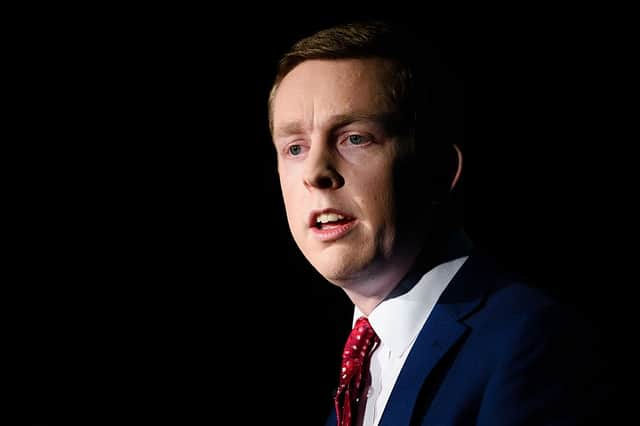Exclusive:Rishi Sunak slammed for failing to replace Minister for Disabled People in mini-reshuffle
and live on Freeview channel 276
Rishi Sunak will no longer have a dedicated Minister for Disabled People following his latest mini reshuffle, NationalWorld understands, and it has now been left vacant for the longest period in 30 years.
The position was vacated when Tom Pursglove became Minister for Legal Migration on Thursday (7 December), after Robert Jenrick’s dramatic resignation last week. Since then the position has not been filled.
Advertisement
Hide AdAdvertisement
Hide AdDowning Street sources told NationalWorld that the “work will be led by one of the existing ministers in the department” and following our story confirmed there would no longer be a dedicated minister. Mel Stride is the Work and Pensions Secretary, while Jo Churchill is the Minister for Employment, Mims Davies the Minister for Social Mobility, Youth and Progression and Paul Maynard the Minister for Pensions.
The DWP declined to comment whether the role was being replaced or reallocated, merely telling saying: “Ministerial announcements will happen in the usual way." Responding to NationalWorld's story, Rishi Sunak's official spokesman said: "We will have a minister who will lead on that important work. What you will continue to see is the government showing strong support for disabled people."
James Taylor, director of strategy at disability equality charity Scope, hit out at the government, saying: “This is the longest gap without a Minister for Disabled People in the last 30 years. What kind of message does that send to Britain’s 16 million disabled people? Does the Prime Minister think it’s acceptable to keep this post vacant?
“Life costs more if you are disabled. We are in the middle of a cost of living crisis. There hasn’t been a cost of living payment for disabled people this winter. And negative welfare rhetoric has ramped up this year.


Advertisement
Hide AdAdvertisement
Hide Ad“We need this position to be a champion of disabled people and disability, and make sure policy doesn’t leave disabled people behind and disadvantaged. It’s time for the government to stick to its promises, and take disability and disabled people seriously.”
While Vicky Foxcroft, Labour's Shadow Minister for Disabled People, said: "Six days with no Minister for Disabled People. Are we joking? It’s Disability History Month. This isn’t ok, at all. Rishi Sunak, are you going to appoint someone to this vitally important role which represents 24% of the population?"
There has been a dedicated minister for disabled people since the mid 1990s. Current Cabinet Ministers Esther McVey, Claire Coutinho and Mark Harper have previously held the role under the Tories.
The government’s website says the Minister for Disabled People looks after disability policy and cross-government responsibility for disabled people. It comes after Jeremy Hunt announced in the Autumn Statement that the government would be pushing more disabled people to return to work.
Advertisement
Hide AdAdvertisement
Hide AdHe said the work capability assessment will be reformed “to reflect greater flexibility and availability of home-working after the pandemic” and outlined £1.3 billion in spending over the next five years which he said will be focused on helping nearly 700,000 people with health conditions find jobs.
At the time, Hunt said: “Every year we sign off over 100,000 people on to benefits with no requirement to look for work because of sickness or disability. That waste of potential is wrong economically and wrong morally.”
Following this, the Disability Benefits Consortium, a national coalition of more than 100 charities, described the Government’s plan as a “cynical attack on disability benefits (which) will have a devastating impact on those on the lowest incomes”.
Anastasia Berry, policy co-chair of the consortium, said just one in 10 jobs advertised this year has offered home-working as an option, and described access to health and care support, “which could keep people in work for longer, including mental health and social care”, as becoming “increasingly strained”.
Advertisement
Hide AdAdvertisement
Hide AdUnited Response, a member of the consortium, said there is “little point forcing people into the wrong job as this will simply lead to a revolving door of staff” and called for “targeted and specialist support” for people “rather than using punitive punishments”. Its chief executive Tim Cooper said: “Disability should not be framed as a lifestyle choice when there is a real risk of sanctions pushing people already dealing with a cost-of-living crisis further into poverty this winter.”
Ralph Blackburn is NationalWorld’s politics editor based in Westminster, where he gets special access to Parliament, MPs and government briefings. If you liked this article you can follow Ralph on X (Twitter) here and sign up to his free weekly newsletter Politics Uncovered, which brings you the latest analysis and gossip from Westminster every Sunday morning.
Comment Guidelines
National World encourages reader discussion on our stories. User feedback, insights and back-and-forth exchanges add a rich layer of context to reporting. Please review our Community Guidelines before commenting.
